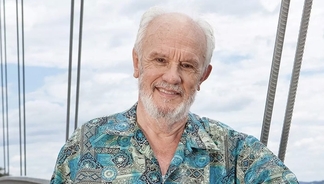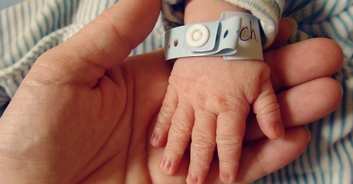On the surface, James Harrison seems like a fairly regular 81-year-old. The friendly pensioner loves his daughter and his grandchildren, he collects stamps and he can often be found going for walks near his home Australia's central coast. But, under the surface of James' skin lies something extraordinary: his blood.
James is known as "The Man with the Golden Arm" due to the substance that is flowing through his veins and every week for the past 60 years, he has donated blood plasma from his right arm.
The reason behind James' unique blood has never been confirmed, but it's believed that it relates to a serious medical procedure he underwent when he was just a teenager.
"In 1951, I had a chest operation where they removed a lung -- and I was 14," recalls Harrison.
"When I came out of the operation, or a couple days after, my father was explaining what had happened. He said I had (received) 13 units (liters) of blood and my life had been saved by unknown people. He was a donor himself, so I said when I'm old enough, I'll become a blood donor."
However, while Harrison was giving blood as a means to give back to those who had helped him previously, doctors soon noticed that there was something special about him. Harrison's blood, they said, could be the answer to a deadly problem that was sweeping through Australia.
"In Australia, up until about 1967, there were literally thousands of babies dying each year, doctors didn't know why, and it was awful," outlines Jemma Falkenmire of the Australian Red Cross Blood Service. "Women were having numerous miscarriages and babies were being born with brain damage."
The reason behind the deaths was rhesus disease - a condition in which a pregnant woman's blood attacks her unborn baby's blood cells, leading to brain damage, or in the worst case scenario: death.
The disease takes place when a pregnant woman has rhesus-negative blood (RhD negative) and the baby has rhesus-positive blood (RhD positive). If the mother has become sensitized to rhesus-positive blood - which can happen during a previous pregnancy - she may then produce antibodies that can destroy the baby's "foreign" blood cells.
After he was found to have an unusual antibody in his blood during the 1960s, Harrison began working with doctors to use his blood in order to develop an injection called Anti-D. The jab prevents women with the rhesus-negative blood from developing the RhD antibodies during pregnancy.
Due to the precious nature of his blood, Harrison is credited with saving the lives of over 2 million unborn babies. "Every bag of blood is precious, but James' blood is particularly extraordinary," says Falkenmire.
"His blood is actually used to make a life-saving medication, given to moms whose blood is at risk of attacking their unborn babies. Every batch of Anti-D that has ever been made in Australia has come from James' blood.
"And more than 17% of women in Australia are at risk, so James has helped save a lot of lives."
While it's still unknown exactly how James came to have this life-saving blood, doctors believe it may have something to do with the transfusions he received during his lung surgery. "I think James is irreplaceable for us," says Falkenmire.
"I don't think anyone will be able to do what he's done, but certainly we do need people to step into his shoes.
"He will have to retire in the next couple years, and I guess for us the hope is there will be people who will donate, who will also ... have this antibody and become lifesavers in the same way he has, and all we can do is hope there will be people out there generous enough to do it, and selflessly in the way he's done."
Back in his Australia, Harrison is known as a hero and has won multiple awards. He's donated his blood more than 1,000 times but, despite being a veteran of the field, he still can't stand looking at the needle. "Never once have I watched the needle go in my arm," he says.
"I look at the ceiling or the nurses, maybe talk to them a bit, but never once have I watched the needle go in my arm. I can't stand the sight of blood, and I can't stand pain."
James' story shows that not all heroes wear capes - some are 80-year-old men who, despite having undergone the procedures numerous times, still can't face the idea of a needle. In all seriousness though, this man is an absolute legend and, the more people like him in the world, the better it would be.


